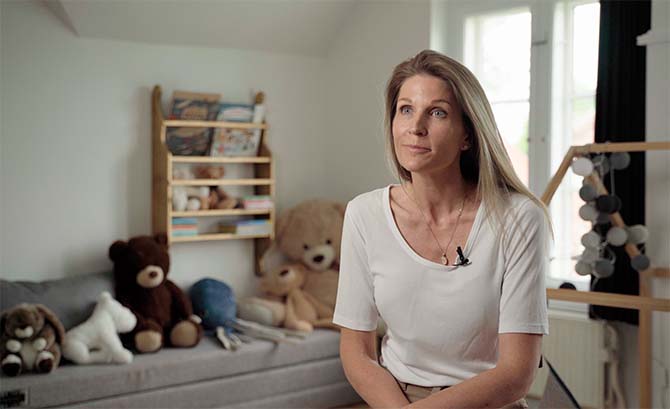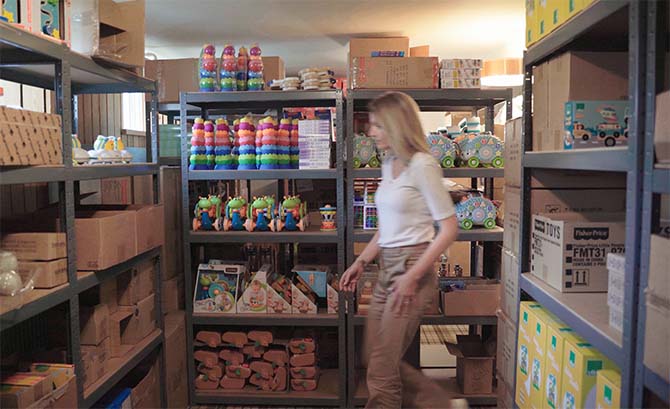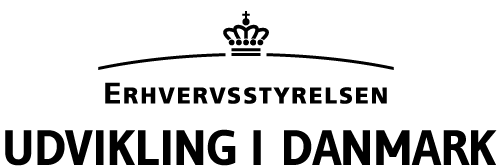NB. Udbyderen af servicen sætter cookies på din computer, når du afspiller eller deler videoen. Læs mere om cookies.
During COVID-19, online shopping grew explosively, which almost brought down the entrepreneur from Northern Jutland Dorthe Klitgaard Thomsen’s company, DearBaby – Lejetøjskassen. Her business idea – subscription to toy boxes for toddlers – became such a hit when restrictions kept people at home during COVID-19 that it quickly became a problem.
“I tried to handle over 100 customers on my phone and MacBook. It didn't go well – customers got the wrong items, and we spent an incredible amount of time on handling orders manually,” Dorthe Klitgaard Thomsen explains. She runs the company from her home in the Aalborg suburb Hasseris with her husband, Joen Rosenmeier.
The rescue came in the shape of a digital competence boost in the EU project KOMPAS – Nordjysk kompetenceløft, which is run by Business Hub Northern Denmark. With the help of KOMPAS’ experts, customer records and order management were digitised and professionalised during the autumn of 2021.
“This means that we spend far less time not least on the return process today, time that is now instead spend on developing the toy boxes,” Dorthe Klitgaard Thomsen says.
In the EU project, experts also helped develop a data-driven business model.
“We have really discovered the potential in digitisation, and we have only just begun,” Joen Rosenmeier says: “We now have data on our customers' consumption, and thus, we have better purchasing and inventory management.”

The idea for subscription toys came to Dorthe Klitgaard Thomsen when she had two children from 2017 to 2019. She often bought new toys and found that the pile of almost unused toys grew bigger and bigger as the children grew up. Therefore, she developed a subscription model which gives parents the opportunity to order toy boxes which correspond to the development of children's motor skills. In 2020, she founded the company “DearBaby – Lejetøjskassen”. Photo: Rostra Kommunikation
Dorthe Klitgaard Thomsen also used the business promotion system to test her business idea before founding her company. In the EU project Innovative Growth, which is also run by Business Hub Northern Denmark, she got help to research the market.
“I wanted to test my business idea, so I went to baby-hymn-singing to talk to mothers and used our members to test the toys, and I had experts help me find toys that are helpful for the development of children’s motor skills. The entire first year was spent researching, planning, and developing, and then we were ready.”
In KOMPAS – Nordjysk kompetenceløft, smaller Northern Jutland companies can get DKK 25,000 or DKK 50,000 in support for a tailored competence upgrade of both managers and employees, depending on the company’s size and needs. The prerequisite for participating in the KOMPAS project is to have challenges derived from COVID-19, which are impeding the companies.
Many of the KOMPAS companies request help with sales and marketing. But competence boost in areas such as digitisation and automation as well as management and organisation is also in demand.
“We help on a very specific level – for example with websites – and we also contribute to solving strategic challenges that companies bring to the table. From our perspective, KOMPAS has been a success because we have involved many of the companies for which there are normally not many business promotion offers,” project manager Ulla Møller Jakobsen, Business Hub Northern Denmark, says.
The project runs until New Year, and so far, 139 Northern Jutland companies have either completed a course, have started or have been approved for a course. The goal is for 180 companies to go through a course, and for approx. 400 employees – management and employees – to get a competence boost. To cope with the high demand for the courses, Business Hub Northern Denmark has created waiting lists for the last KOMPAS courses.
In an external evaluation from March 2022, the KOMPAS project receives top marks, and in particular the project’s ability to attract small companies, micro-companies (less than 10 employees), is emphasised. In addition, an effective steering group with, among others, The Danish Chamber of Commerce on board has contributed to good recruitment and business contacts.
For Joen Rosenmeier and Dorthe Klitgaard Thomsen, the KOMPAS course has set the development plans in motion.
“We would like to have a better website, and we also have plans for a test panel with babies. We also have in mind to scale the company to markets abroad, e.g., Norway, Sweden and the Netherlands,” Dorthe Klitgaard Thomsen says today – two years after she founded “DearBaby – Lejetøjskassen”.

It is busy times at the ware-house at Dorthe Klitgaard Thomsen's company “DearBaby - Lejetøjs-kassen” in Aalborg. Photo: Rostra Kommunikation
FACTS About KOMPAS – Nordjysk kompetenceløft
The programme offers tailored competence development for management and employees in smaller Northern Jutland companies. The goal is to help with competence boost in companies that need restructuring after COVID-19, so that the companies get a solid footing and thereby strengthened competitiveness and the opportunity to retain current employees or hire more.
KOMPAS – Nordjysk kompetenceløft started in January 2021 and will end on 31 December 2022. The EU’s Social Fund has co-financed the programme, which is run by Business Hub Northern Denmark with almost DKK 8.8 million.
Read more about KOMPAS – Nordjysk kompetenceløft (in Danish)
FACTS About the EU’s Social Fund
From 2014-2020, the EU's Social Fund, Regional Development Fund and Danish partners invested DKK 1 billion each year in activities to create growth and employment throughout the country.
The Social Fund programme for 2014-2020 targeted entrepreneurship, education, and social inclusion to create more new businesses and a more skilled workforce. These are essential prerequisites for increased productivity, competitiveness, and growth.
Therefore, the EU’s Social Fund co-financed project, which should:
- Increase entrepreneurial activity and ensure growth-oriented competence development in small and medium-sized companies
- Promote social inclusion – via specially designed youth education, integration courses into the labour market and social economic businesses
- Strengthen vocational and higher education

